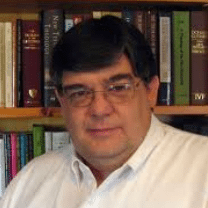
I AM and the Burning Bush
You are familiar with the setting, of course. Having left Egypt forty years before, while tending the sheep of his father-in-law, Moses comes to Mount Horeb and sees “this strange sight” — a bush ablaze with fire though not consumed by that fire. A fire burning on its own, inside the bush. When Moses curiously approaches the bush he finds that it is the angel of the Lord, God himself come to speak to him. It is, therefore, holy ground. And so Moses removes his sandals as he listens to the voice of God. God had come to inform Moses of his plans to redeem his people, Israel, from Egyptian slavery, and his plans for Moses to lead them to a land he had promised to Abraham (Exodus 3). This great event reaches its high point in the revelation of God’s name. Moses asks, “If I come to the people of Israel and say to them, ‘The God of your fathers has sent me to you,’ and they ask me, ‘What is his name?’ what shall I say to them? (Ex. 3:13).”
Uniqueness
“God” and “Lord” are titles, and as important as these designations are in their own right, they are not personal names. Presumably if we could know God’s name we would know more about him. And of course this is precisely the function of God’s names in Scripture: they are his self-revelations. And so God responds to Moses, “I AM WHO I AM. . . . Say this to the people of Israel, “I AM has sent me to you” (Ex. 3:14).”
The name God gives himself is unique: “I AM WHO I AM.” This name is related to “Yahweh,” both derivatives of the verb “to be.” “Yahweh” appears more than 6,800 times in the Old Testament, and in our English Bibles is sometimes rendered “Jehovah” but usually translated “Lord” (all upper case). The exact pronunciation of “Yahweh” is lost to us, but that it derives from this verb “to be” is certain. “I AM” is the name by which God chose to make himself known. “This [I AM] is my name forever, and thus I am to be remembered throughout all generations” (Ex. 3:15; cf. 15:3; 33:19).
Just how is this name significant? Some have suggested that the Hebrew of Exodus 3:14 (“I AM WHO I AM”) should better be understood, “I am / shall continue to be what I always have been,” emphasizing God’s continued faithfulness in fulfillment of the Abrahamic promise (see Gen. 15:12-21). I have little doubt that this name carries implications of God’s faithfulness, as we will see. But I doubt we should follow this suggested translation, not least because in John’s Gospel the Lord Jesus takes this name to himself and consistently translates it in the present tense: “I Am” (e.g., John 8:58).
Eternality
There are perhaps two hints in the context of the burning bush (Ex. 3) that may help us understand the significance of the divine name. First, it may be that God himself expands on the significance of his name: God said to Moses, “I AM WHO I AM.” And he said, “Say this to the people of Israel, ‘I AM has sent me to you.’” God also said to Moses, “Say this to the people of Israel, ‘The Lord, the God of your fathers, the God of Abraham, the God of Isaac, and the God of Jacob, has sent me to you.’ This is my name forever, and thus I am to be remembered throughout all generations” (Ex. 3:14-15).
It would seem that God is emphasizing his eternality. The God who now sends Moses to liberate his people from Egypt is the very same God who promised this to Abraham several hundred years before (Gen. 15:12-21). I AM, the Lord, is the eternal God.
Moses was clearly impressed by this attribute of God and came to appreciate the comfort it affords God’s people. He later wrote a song about it that has been sung now for more than 3,000 years: Lord, you have been our dwelling place in all generations. Before the mountains were brought forth, or ever you had formed the earth and the world, from everlasting to everlasting you are God. You return man to dust and say, “Return, O children of man!” For a thousand years in your sight are but as yesterday when it is past, or as a watch in the night. You sweep them away as with a flood; they are like a dream, like grass that is renewed in the morning (Ps. 90:1-5). Or as Isaac Watts famously rendered it:
Our God, our help in ages past, our hope for years to come,
Our shelter from the stormy blast, and our eternal home.
Before the hills in order stood, or earth received her frame,
From everlasting Thou art God, to endless years the same.
A thousand ages in Thy sight are like an evening gone;
Short as the watch that ends the night before the rising sun.
Time, like an ever rolling stream, bears all its sons away;
They fly, forgotten, as a dream dies at the opening day.
Our God, our help in ages past, our hope for years to come,
Be Thou our guard while troubles last, and our eternal home.
That God is our help is one thing. That he is our eternal help is something significantly more. “I AM WHO I AM” — the eternal (and, may we say, unchanging) God.
Divine Aseity
There is another detail in the context that leads us in this same direction, even perhaps a bit further. Exodus 3:2-3 tell us that God appeared to Moses in a burning bush, and it is emphasized twice that although the bush was burning it was not consumed. There was divine fire in the bush, but the bush itself was not burned. That is to say, the fire was self-sufficient. It was self-perpetuating. This fire required no fuel to sustain it — it existed of its own.
When discussing the attributes of God we often speak of his eternality, that he had no beginning and has no end. He exists forever. Older theologians often spoke of God’s aseity (pronounced “ah-say’-ity”). This term comes from the Latin and signifies, simply, “from himself.” The aseity of God is the teaching that God is self-existent. He exists eternally, yes, but he exists eternally from himself. He is uncaused and independent. He depends on nothing — and no one — for anything. Just as the divine fire requires no fuel to sustain it, so God himself exists entirely independent of anything or anyone. He is self-sufficient, self-perpetuating, existing only of himself. And so when God names himself “I AM WHO I AM,” he reveals something about himself. He is a God like no other, perfect in his own being. Click To Tweet
In Isaiah 57:15 God tells us something about himself that is quite beyond our ability to grasp. He says that he “inhabits eternity.” I confess that I can scarcely begin to understand God’s eternality, and so I really have no idea what it means to “inhabit eternity.” Here I acknowledge that I’m in over my head. But perhaps this doctrine of God’s aseity helps us just a bit: God exists eternally of himself, dependent on or in need of nothing outside himself.
Think of it. God is in need of nothing. He created us but not because he needed us. And we worship him not because he needs it, but because he is worthy of it. We serve him not because he depends on it, but because he is worthy of it. We seek to advance his cause, but not because he needs our help. We enjoy his fellowship not because we somehow persuaded or manipulated him or otherwise earned our way to him. As in the case of Moses we know God only because he took the initiative. This God is in need of nothing.
And so when God names himself “I AM WHO I AM,” he reveals something about himself. Unlike all created things and beings, God the Creator is himself uncreated, uncaused, independent, and eternal. He is a God like no other, perfect in his own being.
(Originally published in The Gospel Witness Vol. 90, No.5 [Issue 3074], Nov. 2011; pp.7-9.)

